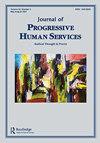The Colonial Character of the Drug Treatment Superstructure: Theorizing Collective Cultural Resistance to Varying Manifestations of Coercive Control
IF 0.8
Q1 SOCIAL WORK
引用次数: 0
Abstract
ABSTRACT Despite being one of the smallest racial/ethnic groups in the State of Hawai‘i (~10–21%), Native Hawaiians have persistently and disparately comprised the largest racial/ethnic group in the state public treatment system (≥43%). One outcome of Hawaiʻi’s history as a colonial subject, is that social institutions of the State became characterized by the imposition of social control emphasizing the maintenance of punishment mediated through the dynamics of state-sanctioned coercion. At both the individual and community level, implications are drawn out to hypothesize that treatment avoidance or community-wide disengagement patterns of help-seeking, is a manifest expression of collective cultural resistance to what has long been regarded by Hawaiian communities as a “haole [foreign] system” of medicine. While cultural interventions imbued with cultural sensitivities remain relevant to improving treatment care, there is a false assumption embedded within the current treatment paradigm, projecting a doctrine of repeated and prolonged calls for cultural competence and cultural humility to correct the status quo of cultural deficiencies in the publicly funded treatment system. This article proposes an alternative theory, arguing that the source of the problem is the existence of a drug treatment superstructure itself, rooted in the historical reproduction of colonial persecution and continued subjugation of Native Hawaiian identity.药物治疗上层建筑的殖民特征:将集体文化对各种强制控制表现的抵抗理论化
摘要尽管夏威夷原住民是夏威夷州最小的种族/族裔群体之一(约10-21%),但在该州的公共待遇体系中,他们始终是最大的种族/民族群体(≥43%)。夏威夷作为殖民主体的历史的一个结果是,国家的社会制度以实施社会控制为特征,强调通过国家批准的胁迫动态来维持惩罚。在个人和社区层面,人们都提出了这样的假设,即回避治疗或社区范围内寻求帮助的脱离模式,是对夏威夷社区长期以来视为“外国医疗体系”的集体文化抵抗的明显表现。尽管充满文化敏感性的文化干预措施仍然与改善治疗护理有关,但目前的治疗模式中存在一种错误的假设,即反复和长期呼吁文化能力和文化谦逊,以纠正公共资助治疗系统中文化缺陷的现状。本文提出了另一种理论,认为问题的根源是戒毒所上层建筑本身的存在,其根源在于殖民迫害的历史再现和夏威夷原住民身份的持续征服。
本文章由计算机程序翻译,如有差异,请以英文原文为准。
求助全文
约1分钟内获得全文
求助全文
来源期刊

Journal of Progressive Human Services
SOCIAL WORK-
CiteScore
3.20
自引率
8.30%
发文量
14
期刊介绍:
The only journal of its kind in the United States, the Journal of Progressive Human Services covers political, social, personal, and professional problems in human services from a progressive perspective. The journal stimulates debate about major social issues and contributes to the development of the analytical tools needed for building a caring society based on equality and justice. The journal"s contributors examine oppressed and vulnerable groups, struggles by workers and clients on the job and in the community, dilemmas of practice in conservative contexts, and strategies for ending racism, sexism, ageism, heterosexism, and discrimination of persons who are disabled and psychologically distressed.
 求助内容:
求助内容: 应助结果提醒方式:
应助结果提醒方式:


